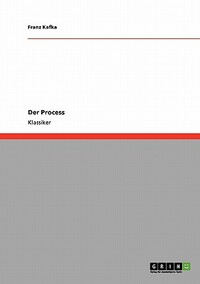Take a photo of a barcode or cover
I think I'll enjoy being able to say I've read this book significantly more than I actually enjoyed reading it.
For those unfamiliar with it (as I was until this week), it's 200 pages about a man who's been told he's under arrest but given no further details., and allowed to go about his daily life. His efforts to discover more about his 'arrest', the authority and reason behind it, simply further ensnare him, and the imminent (immanent?) trial gradually consumes him.
Most of the book is set in shadowy, close rooms, hot and stuffy with people and their misfortunes, and I think this pretty well reflected my reading experience. Never is the reader allowed to relax, never to feel any certainty or joy. The kind of existentialist and bizarrist writing I'm most familiar with from Dostoevsky, Bulgakov, Gogol.
The main difference I found was that the Russian writers are better at weaving humour in amidst the bizarre. There were precious few moments of light in The Trial. Plus Kafka pulls back from the brink of bizarre absolutism in a way that the Russians don't. The reader feels like the plot line *might yet* be redeemed and the characters not completely beyond the pale.
An important novel about the uncertainty of the human condition, which most of us would do well to take on board, but not a pleasure to read.
Reading it made me more aware of ways we allow ourselves to feel restricted or 'under arrest', which hamper us from fully enjoying the gift of life... and maybe that's the point.
For those unfamiliar with it (as I was until this week), it's 200 pages about a man who's been told he's under arrest but given no further details., and allowed to go about his daily life. His efforts to discover more about his 'arrest', the authority and reason behind it, simply further ensnare him, and the imminent (immanent?) trial gradually consumes him.
Most of the book is set in shadowy, close rooms, hot and stuffy with people and their misfortunes, and I think this pretty well reflected my reading experience. Never is the reader allowed to relax, never to feel any certainty or joy. The kind of existentialist and bizarrist writing I'm most familiar with from Dostoevsky, Bulgakov, Gogol.
The main difference I found was that the Russian writers are better at weaving humour in amidst the bizarre. There were precious few moments of light in The Trial. Plus Kafka pulls back from the brink of bizarre absolutism in a way that the Russians don't. The reader feels like the plot line *might yet* be redeemed and the characters not completely beyond the pale.
An important novel about the uncertainty of the human condition, which most of us would do well to take on board, but not a pleasure to read.
Reading it made me more aware of ways we allow ourselves to feel restricted or 'under arrest', which hamper us from fully enjoying the gift of life... and maybe that's the point.
Probably the best and most disturbing Kafka novel I've read. I can't think of another author who so precisely conjures the dream logic of a nightmare. The fact the story is unfinished only adds to the terrifying experience of reading it. In general, Kafka is all mood and vibe and this story of a bank clerk defending himself against a crime he's unable to learn anything about is the apotheosis of the style that has become known as Kafkaesque. Have you ever had a nightmare where you were being endlessly pursued by some malignant force you couldn't quite understand but could feel? That's Kafka's realm and the authentic experience of this novel.
dark
mysterious
reflective
slow-paced
Plot or Character Driven:
Character
Strong character development:
No
Loveable characters:
Complicated
Diverse cast of characters:
No
Flaws of characters a main focus:
Complicated
Eigentlich wollte ich hier nur "sehr kafkaesk" schreiben und mir clever vorkommen, aber das Buch hat schon mehr in mir bewegt. Über weite Strecken, immer dann, wenn es in eine Art philosophischen Dialogmodus verfällt (mit dem Kunstmaler, dem Kaufmann Block, dem Kaplan), finde ich es eine brillante Meditation nicht nur über Schuld und Schuldpflichtigkeit, sondern in erstaunlicher Hellsicht auch über die deutsche Seele. Weniger gut haben mir die fast schon zu deutlich freudianischen Episoden K.s mit Frauen gefallen, die zwar aus Kafkas Sicht wahrscheinlich recht stark Teil des Prozesses sind, aber aus heutiger Perspektive selbstmitleidig und gestrig wirken, während die Beschreibungen des Gerichtssystems und des aussichtslosen Kampfes dagegen nichts an Aktualität verloren haben.
challenging
slow-paced
Plot or Character Driven:
Character
Loveable characters:
Complicated
Diverse cast of characters:
Yes
Flaws of characters a main focus:
No
The quintessential Kafka. Read it to impress my then girlfriend (now fiancé, so it went well).
You should be in the mood to read something slow when reading this, because it's (from my point of view) kind of the point of the book, where the main character is sent back and forth in a seemingly endless bureaucracy.
The biggest pro of this book is that, when you've read it, you can use the comment "Well, this is just kafkaesque" and actually know what it means.
You should be in the mood to read something slow when reading this, because it's (from my point of view) kind of the point of the book, where the main character is sent back and forth in a seemingly endless bureaucracy.
The biggest pro of this book is that, when you've read it, you can use the comment "Well, this is just kafkaesque" and actually know what it means.
Just a very bizarre yet intriguing book to read.
The book follows Josef K who is arrested on his birthday for a crime he is never told and his book follows his journey thereafter. It depicts scenes in which K tries to get his trial resolved while examining the relationships he has in his life and how they change as a result of the trial.
It's bizarre and now having finished it, I'm left with more questions about not just the story but the philosophy behind it as well. But perhaps, that is the purpose of the trial, to question.
So many absurd scenes and moments border on it being a comedy (like the chapter with the flogger) while juxtaposed with chapters like the cathedral that make me ponder the message.
To me, this book doesn't explore bureaucracy as the title suggests but rather is an exploration of ignorance, free will, and hopelessness. So much of what is said in the book contradicts itself in the information K is told about the court and by the time the second half begins, I realize the situation that was presented was never meant to have a conclusion.
If you the reader want to explore the bizarre thought-provoking worlds that Kafka writes about, I'd recommend the trial. I would consider it classic. But be prepared as this is not a traditional story by any means, even as I write this, I still am unsure what to think or feel. So much material that needs more than 1 read to be understood
The book follows Josef K who is arrested on his birthday for a crime he is never told and his book follows his journey thereafter. It depicts scenes in which K tries to get his trial resolved while examining the relationships he has in his life and how they change as a result of the trial.
It's bizarre and now having finished it, I'm left with more questions about not just the story but the philosophy behind it as well. But perhaps, that is the purpose of the trial, to question.
So many absurd scenes and moments border on it being a comedy (like the chapter with the flogger) while juxtaposed with chapters like the cathedral that make me ponder the message.
To me, this book doesn't explore bureaucracy as the title suggests but rather is an exploration of ignorance, free will, and hopelessness. So much of what is said in the book contradicts itself in the information K is told about the court and by the time the second half begins, I realize the situation that was presented was never meant to have a conclusion.
If you the reader want to explore the bizarre thought-provoking worlds that Kafka writes about, I'd recommend the trial. I would consider it classic. But be prepared as this is not a traditional story by any means, even as I write this, I still am unsure what to think or feel. So much material that needs more than 1 read to be understood
reflective
slow-paced
Plot or Character Driven:
Plot
Strong character development:
No
Loveable characters:
No
Flaws of characters a main focus:
Complicated
mysterious
relaxing
reflective
tense
medium-paced
Plot or Character Driven:
Plot



